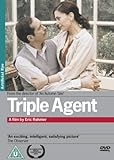Eye For Film >> Movies >> Triple Agent (2004) Film Review
Triple Agent
Reviewed by: David Haviland
In Night Moves, Gene Hackman's character gives a refreshingly unpretentious summary of Eric Rohmer's films: "I saw a Rohmer film once. It was kind of like watching paint dry."
Triple Agent is Rohmer's latest soporific effort and is as uncompromising as ever.
The plot, loosely based on historical events, is set in Paris, 1936, where Fyodor (Serge Renko) is a high-ranking Russian spy. Arsinoé (Katerina Didaskalu), his devoted wife, is frustrated by his secrecy, but he explains that this is only because he doesn't want to lie to her. To others, he is deliberately ambiguous, seeming at various times to be on the side of France, White Russia, Communist Russia and even Nazi Germany.
To say the plot develops from here would be slightly misleading, as all of it takes place off-screen. Although this is notionally a spy story, all the audience actually sees is a series of conversations, which are so static that it might as well be a radio play.
Clearly, Triple Agent is designed for the arthouse, rather than the multiplex, so there is no point judging it on the same terms as a thriller. However, we might expect the film to engage us with more emotional drama.
Instead, the dialogue twists and turns around whether or not Fyodor is working for the reds, whites or tricolores. On some levels, these are good scenes, with subtle, witty dialogue and compelling performances. However, the film is so set-bound that we don't believe for a minute that we're watching international espionage at work; it just looks like cheap theatre.
Rohmer's rejection of genre becomes increasingly frustrating, as the film loses its rhythm and, inexcusably, kills off major characters without showing us how.
No doubt, his fans will appreciate the film's difference, while others may find it comparable to watching paint dry.
Reviewed on: 30 Oct 2004


















